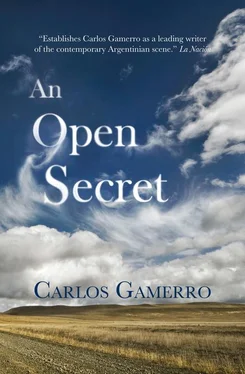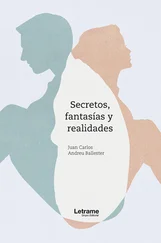“Could this have been the one?” I’ll ask.
“Who knows. The metal’s had twenty years to rust. Could’ve been any of them. Does it matter?”
“I guess not. And I don’t think our friend will want to tell us. How many ribs did you say?”
“Three.”
“Think we’re a few short?”
I’ll manage to get a smile from him. The situation will make me feel a little selfish. At the end of the day, when this story’s all over, I can go home and say fuck them, but Guido has to go on living here. And you never know with cops.
“There won’t be any problems will there?” I’ll ask. “With the cops I mean.”
“I’ve taken care of it,” he’ll reply. “They stopped by the factory yesterday.”
“You didn’t say anything,” I’ll protest. “I swear I—”
“Wasn’t worth bothering you about. I’ve told you, it’s all taken care of.”
“How much?”
“A hundred.”
“I’ll give you half,” I’ll offer, reaching for my wallet. And then he’ll look me in the eye and grin from ear to ear, like when we were kids and had got into a spot of bother.
“Please,” he’ll raise his hand to reject the offer. “The next one’s on you.”
“THEY PUT AN OFFICER on guard for the night, Ramírez or Rodríguez, can’t remember. Poor Ramírez, the slapping he took. But you got to understand, Saturday at Carnival time the whole town’s out on the razz and down at the binge at the sports centre nearby the air blew him the music of the dance and the whiff of skirt up for a fuck and him all on his tod in the derelict station, with nothing but the toads for company and the snivelling of the bloke in the wagon, which only stopped when Rodríguez went and banged on the side with an iron bar. So he did a bunk, gave the padlock on the sliding door the once-over and went off to the sports centre to find his girlfriend and a couple of bottles of red. That’s right, took them back to the train station — he might of been thoughtless but not irresponsible — and he opened up another of the wagons for his own private party. He was woken up in the small hours by Sergeant Chacón kicking him in the head. He got out you dumbass! He got out! He was shouting at him and threw him out of the wagon half bollock-naked as he was and arse-kicked him along the tracks.” Ex-corporal Sayago chuckles again and, when he manages to stop, he looks at us with tear-filled eyes and then at me:
“’Nother round Maestro?” he asks with a naughty wink. He’s beginning to get matey, it’s time to call it a day. But what can I do?
IT MUST BE ABOUT twelve blocks from the abandoned wagons to the entrance of town, but they’re dark blocks, where a dead light bulb can sit in a street light for months — almost vacant blocks, with dirt streets so seldom trodden that they’re sometimes overgrown with grass from sidewalk to sidewalk — so there’s nothing strange about no one seeing Ezcurra on the first leg of his getaway. What is strange is that he didn’t head for the paved road, where his chances of stopping a passing car and getting away from danger would have been better; the most plausible explanation being that the odds of a patrol car, or someone who’d call one, going past were equally high. What is certain is that between the time they locked him up in a freight wagon and five o’clock, when they got the call at headquarters, any trace of his movements was lost. The people at the sports-centre festivities, which lasted until six in the morning, will assure you he didn’t come that way, and you’d better believe it, because for all the boozing and the debauchery and the costumes, the figure of Darío Ezcurra, with bulging eyes and missing a shoe and a sleeve, his clothes stained ochre from the beating and from squeezing through the rusting metal of the wagon, can’t have been a sight easily overlooked. And without a precise time of escape, it’s impossible to say how long he was wandering about for, who (if anyone) he turned to for help, how many doors (which stayed shut) he knocked on before he resurfaced at the little first-aid ward, where you could always find a light and a duty nurse on at the weekend.
“I CAN TELL YOU THAT,” Guido had told me at the table in Los Tocayos a few days earlier, and Leticia, who was with us, along with the perennial Licho and Iturraspe, nodded gravely. Leticia’s one of the few women from Malihuel who dares to sit at the eminently male domain of the tables in Los Tocayos — says she prefers men’s company to the harpies who only gather to tear strips off other women (her for example, for being here now) and the men certainly appreciate hers, which they flatter with compliments and lighted lighters and even the odd glass of something, with prior permission from her ever-present husband, who proceeded to relate the events of the small hours that final Sunday. “I worked as a volunteer driving the ambulance for two years, not in those days of course but later on, and one of the two nurses, Doña Isadora de Mendonca, the pharmacist’s mother, who’s dead now, told me the story. It was getting light, she said, she’d nodded off reading the magazines opposite the door, which used to be left open in summer, with just the strip curtain, when she saw him appear through the coloured fringe she nearly had a fit from the shock, because like all the others she’d already given him up for dead and the man staring at her from the door looked more like a ghost than a living human being. Help me Doña Isadora, I’m hurt, he managed to get out and she reacted, his voice still coming from this world. She half carried him to the first consulting room, laid him down on the stretcher, undid his shirt and washed his face and body with some gauze soaked in distilled water to see how bad the cuts were. He had two deep ones on his scalp that he’d got on the edges of the corrugated iron when he stuck his head out to scream for help, and another in his groin which was still bleeding badly; the rest was grazing. Call Soandso or Soandso she says he kept repeating, Tell them to come and fetch me, tell them to tell my Mamá. But she was worried about the wound on his leg and decided to call Dr Lugozzi, who was in charge of the little ward till the cancer took him.”
“He realised he was going to die when he saw his tests,” Leticia intervened, and Guido gave her a stern look before going on:
“The doctor came straight away, in the first pair of trousers he could find and his white coat flung on any old how, with his hair all standing on end from bed and his eyes red he grabbed her by the arm and dragged her into his office. Are you crazy? How come you let him in? Don’t you know he’s wanted by the whole provincial police force? This man’s a fugitive from justice and we have to report him rightaway! And she says Doctor, look at what they’ve done to him already and he says you want us to end up like that too? Go and ring straight away and from the next-door room she heard the doctor saying to him take it easy Darío, Isadora’s calling your family, come here and I’ll fix you up, and three minutes after hanging up the nurse heard the squeal of brakes and the slamming of car doors. It’s only six blocks from the headquarters.”
“Didn’t Ezcurra do anything?” I asked.
Guido, Leticia, Iturraspe and even Nene Larrieu looked at each other for a few seconds before one of them dared to reply. Only Licho, who thinks Ezcurra has a wife and children in Casilda, stayed out of it. It was Leticia who finally plucked up the courage.
“Doña Isadora swore blind that after they brought Ezcurra out with legs so weak they had to carry by the armpits she found a used syringe in the bin liner which she’d changed at the start of her shift and an almost empty phial of some injectable tranquilliser or other on the steel table.”
Читать дальше












